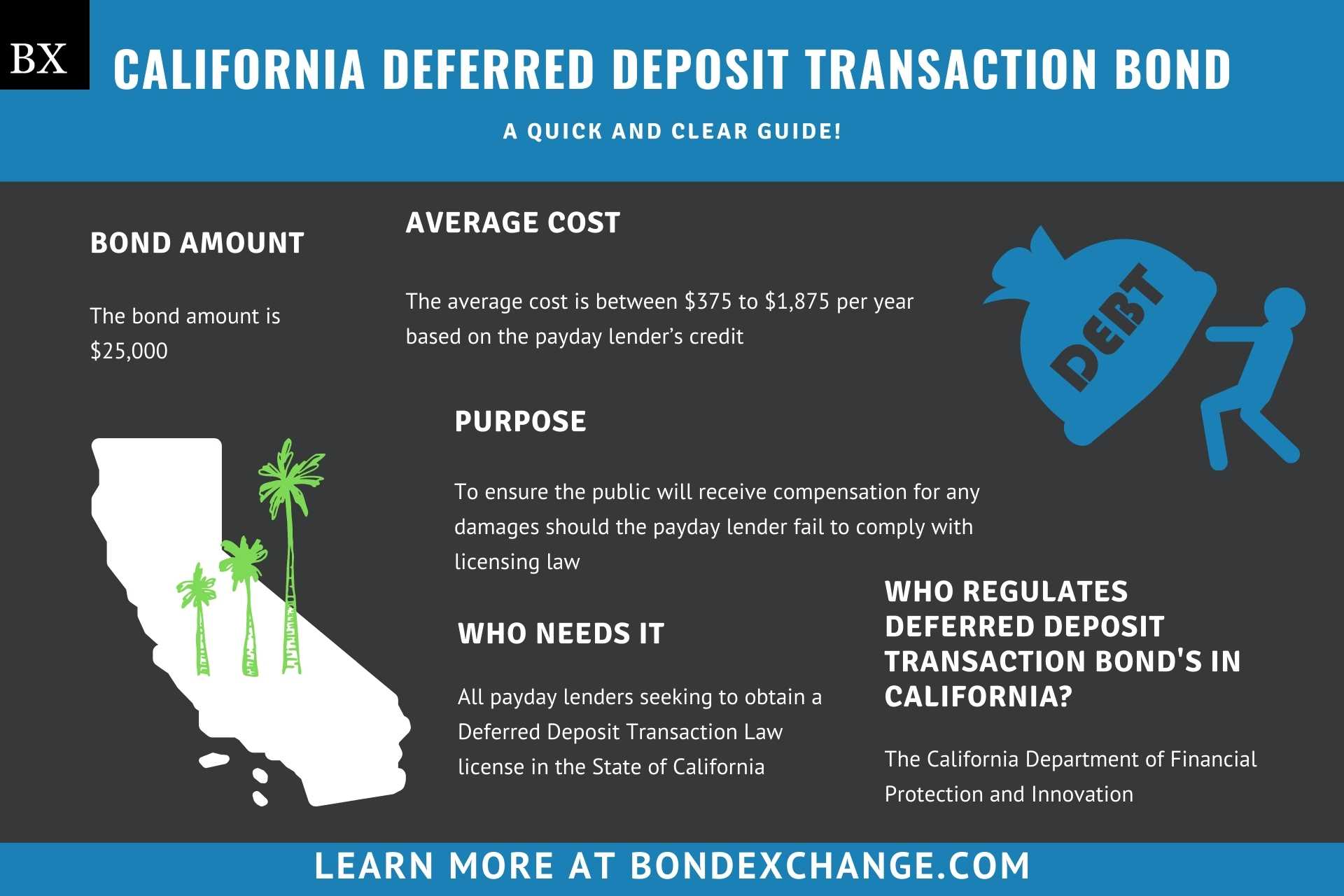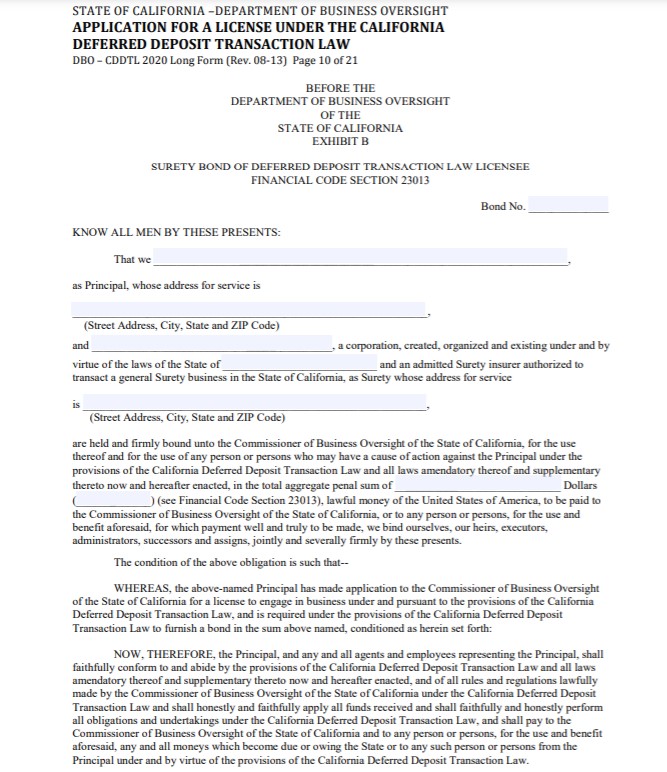California Deferred Deposit Transaction Bond : A Comprehensive Guide
March 18, 2021

This guide provides information for insurance agents to help payday lenders obtain California Deferred Deposit Transaction Bonds
At a Glance:
- Average Cost: Between $375 to $1,875 per year based on the payday lender’s credit
- Bond Amount: $25,000
- Who Needs It: All payday lenders seeking to obtain a Deferred Deposit Transaction Law license in the State of California
- Purpose: To ensure the public will receive compensation for any damages should the payday lender fail to comply with licensing law
- Who Regulates Payday Lenders in California: The California Department of Financial Protection and Innovation
Background
California Deferred Deposit Transaction Law requires all payday lenders operating in the state to obtain a license with the Department of Financial Protection and Innovation. The California legislature enacted the licensing laws and regulations to ensure that payday lenders engage in ethical business practices. In order to provide financial security for the enforcement of the licensing law, payday lenders must purchase and maintain a $25,000 deferred deposit transaction surety bond to be eligible for licensure.
What is the Purpose of the California Deferred Deposit Transaction Bond?
California requires payday lenders to purchase the Deferred Deposit Transaction bond as part of the application process to obtain a Deferred Deposit Transaction Law license. The bond ensures that the public will receive compensation for financial harm if the payday lender fails to comply with the licensing regulations. In short, the bond is a type of insurance that protects the public if the payday lender breaks licensing laws.

How Can an Insurance Agent Obtain a California Deferred Deposit Transaction Surety Bond?
BondExchange makes obtaining a California Deferred Deposit Transaction Bond easy. Simply login to your account and use our keyword search to find the “deferred” bond in our database. Don’t have a login? Enroll now and let us help you satisfy your customers’ needs. Our friendly underwriting staff is available by phone (800) 438-1162, email or chat from 7:30 AM to 7:00 PM EST to assist you.
At BondExchange, our 40 years of experience, leading technology, and access to markets ensures that we have the knowledge and resources to provide your clients with fast and friendly service whether obtaining quotes or issuing bonds.
Is a Credit Check Required for the California Deferred Deposit Transaction Bond?
Surety companies will run a credit check on the payday lender to determine eligibility and pricing for the California Deferred Deposit Transaction bond. Lenders with excellent credit and work experience can expect to receive the best rates. Lenders with poor credit may be declined by some surety companies or pay higher rates. The credit check is a “soft hit”, meaning that the credit check will not affect the lender’s credit.
How Much Does the California Deferred Deposit Transaction Bond Cost?
The California Deferred Deposit Transaction surety bond can cost anywhere between $375 to $1,875 per year. Insurance companies determine the rate based on a number of factors including your customer’s credit score and experience. The chart below offers a quick reference for the approximate bond cost on a $25,000 bond requirement.
$25,000 Deferred Deposit Transaction Bond Cost
| Credit Score | Bond Cost (1 year) |
|---|---|
| 800+ | $375 |
| 650 – 799 | $500 |
| 600 – 649 | $1,000 |
| 550 – 599 | $1,875 |
*The credit score ranges do not include other factors that may result in a change to the annual premium offered to your customers, including but not limited to, years of experience and underlying credit factors contained within the business owner’s credit report.
How does California Define “Deferred Deposit Transaction”?
To paraphrase California Statute 23005, a deferred deposit transaction is the act of delaying the deposit of an individual’s personal check until a certain date contained within a written agreement. Any individual or business entity who arranges a deferred deposit transaction, either directly or indirectly, is considered a payday lender and is subject to the licensing requirements.
How do Payday Lenders Apply for a License in California?
Payday lenders in California must navigate several steps to secure their Deferred Deposit Transaction license. Below are the general guidelines, but payday lenders should refer to the application form for details on the process.
License Period – The California Deferred Deposit Transaction license does not expire and will remain active until revoked or surrendered
Step 1 – Meet the Net Worth Requirements
Applicants for the California Deferred Deposit Transaction License must first amass a tangible net worth (assets – liabilities) of at least $25,000. Payday lenders must submit financial statements verifying their net worth when submitting their license application.
Step 2 – Purchase a Surety Bond
Payday lenders must purchase and maintain a $25,000 deferred deposit transaction surety bond
Step 3 – Complete the Application
All Deferred Deposit Transaction License applications should be mailed to the following address:
Department of Financial Protection and Innovation
320 West 4th Street, Suite 750
Los Angeles, CA 90013-2344
Payday lenders must complete the application in its entirety, and submit the following items:
-
- Live Scan Fingerprint Service form
- Financial statements indicating a net worth of at least $25,000
- A $200 licensing fee (per location) and a $100 investigative fee
Payday lenders must submit a license application for each branch location they operate.
Do California Payday Lenders Need to Renew Their License?
No, the California Deferred Deposit Transaction license does not expire and will remain active until revoked or surrendered.
What Are the Insurance Requirements for the California Deferred Deposit Transaction License?
The State of California does not require payday lenders to obtain any form of liability insurance as a prerequisite to obtaining a Deferred Deposit Transaction License. Payday lenders must purchase and maintain a $25,000 deferred deposit transaction surety bond.
How Do California Payday Lenders File Their Bond?
Payday lenders should mail the completed bond form, including the power of attorney, to the following address:
Department of Financial Protection and Innovation
320 West 4th Street, Suite 750
Los Angeles, CA 90013-2344
The deferred deposit advance surety bond requires signatures from both the surety company that issues the bond and the payday lender. The surety company should include the following information on the bond form:
- Legal name and address of entity/individual(s) buying the bond
- Surety company’s name, state of incorporation, and address and
- Bond amount
- Date the bond goes into effect
What Can Payday Lenders Do to Avoid Claims Against the California Deferred Deposit Transaction Bond?
To avoid claims on the Deferred Deposit Transaction Bond, contractors must follow all license regulations in the state, including some of the most important issues below that tend to cause claims:
- Pay all required taxes and fees
- Do not engage in any acts of fraud
What Other Insurance Products Can Agents Offer Payday Lenders in California?
California does not require payday lenders to obtain any form of liability insurance. However, most reputable lenders will seek to obtain this insurance anyway. Bonds are our only business at BondExchange, so we do not issue liability insurance, but our agents often utilize brokers for this specific line of business. A list of brokers in this space can be found here.
How Can Insurance Agents Prospect for California Payday Lender Customers?
California conveniently provides a public database to search for active payday lenders in the state. The database can be accessed here. Contact BondExchange for additional marketing resources. Agents can also leverage our print-mail relationships for discounted mailing service

